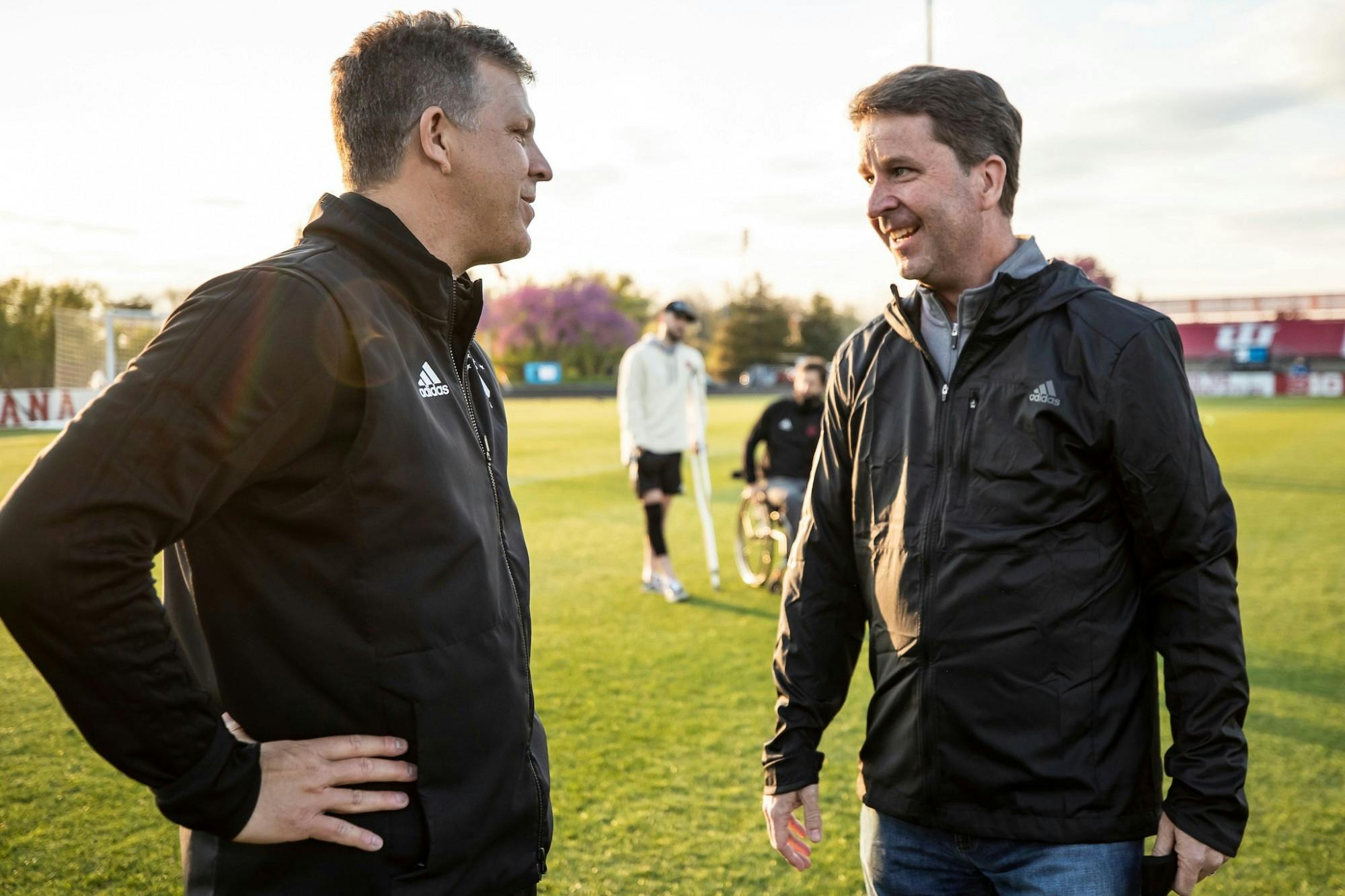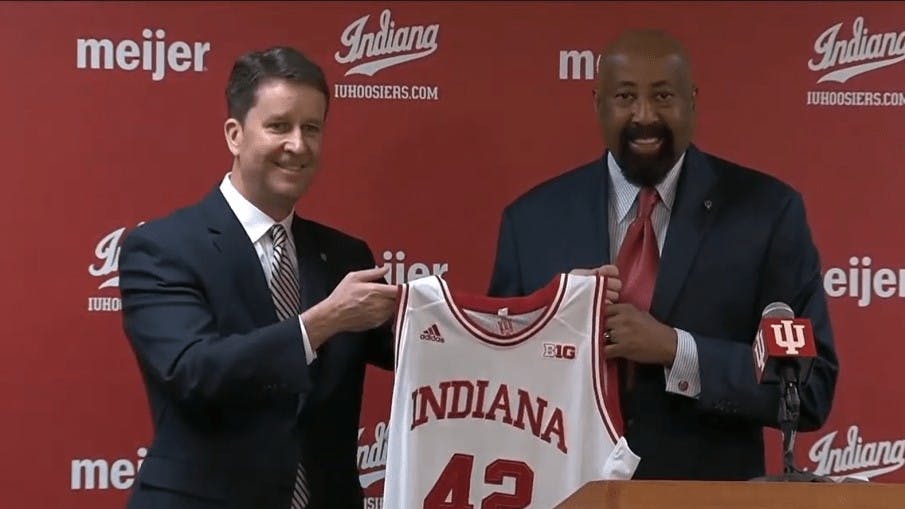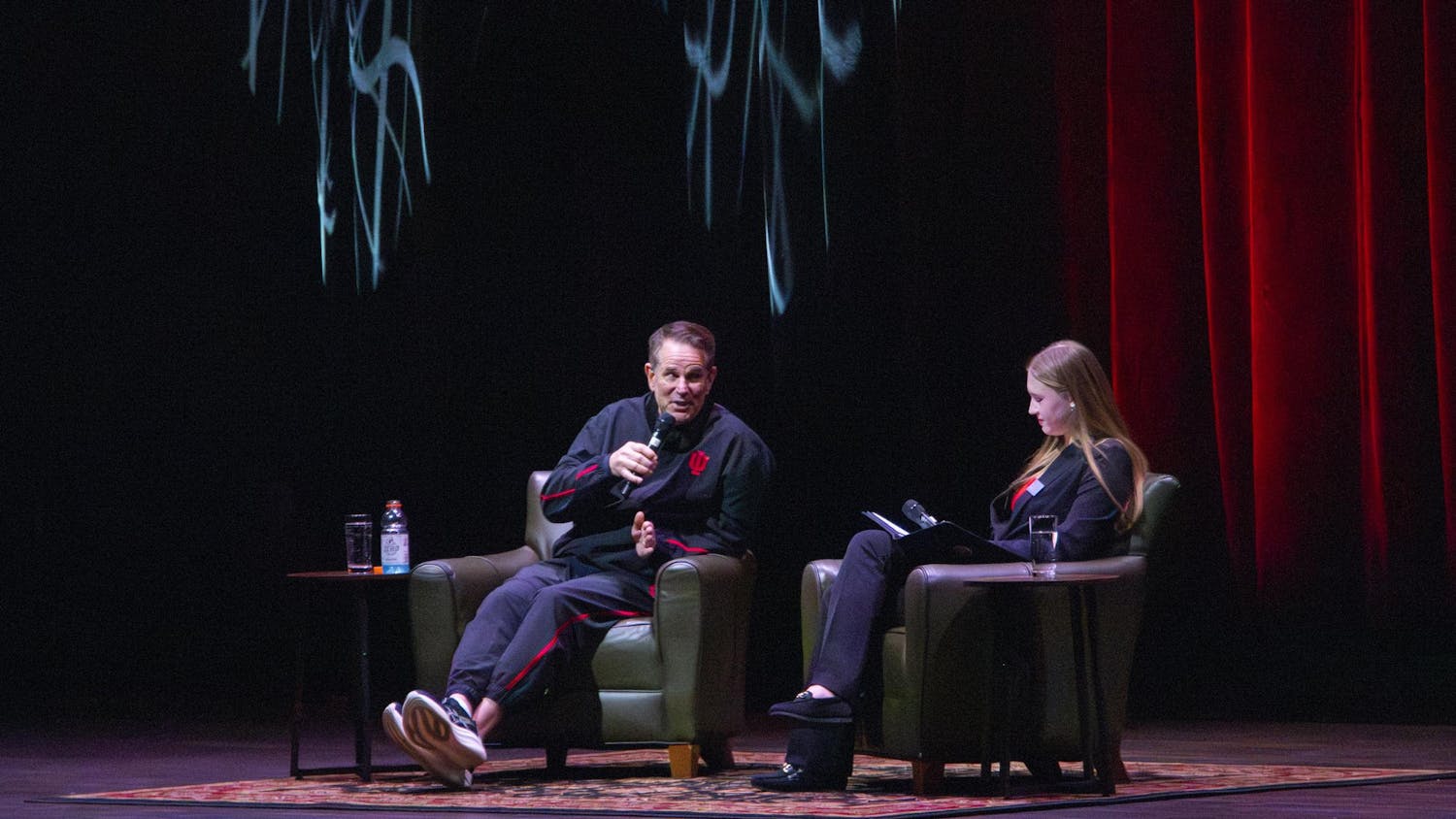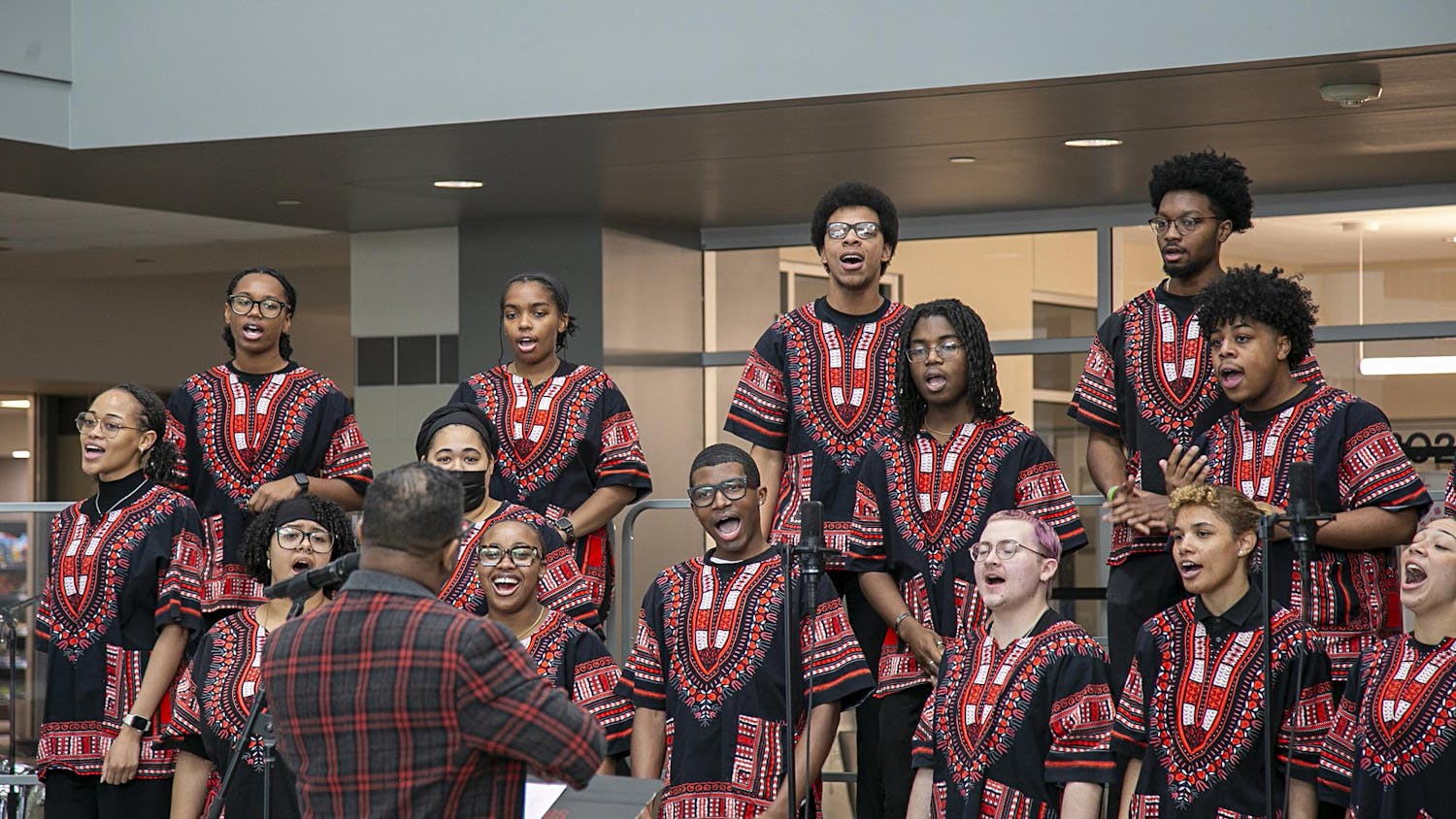Thirty-six years before he’d lead the program he devoted his life to, Scott Dolson mopped the floor at Assembly Hall. He filled up the water coolers. He cleaned the backboards. They had to be spotless — not a single handprint — just as The General preferred.
It was 1984. He was an IU freshman and a manager for head coach Bob Knight and the men’s basketball program. Like all managers, he started with the grunt work.
And slowly, with each year in the program, Dolson’s responsibilities graduated to the more important work — collecting newspapers and game film, tasks Knight considered essential to his program. By his junior year, Dolson was right under the basket, helping cut down the nets in the New Orleans Superdome after Keith Smart drilled a jumper from the left baseline that delivered Knight his third national title and IU its fifth.
Almost four decades later, that storied program is now in the hands of Dolson, the former manager who started at the bottom, mopping floors and scrubbing backboards.
He knows what’s at stake.
But now Dolson can’t sleep. He can’t sleep because he can’t step away from his job.
He’s just finished his first year as the athletic director at his alma mater, the job he’s wanted for more than a decade. It’s a job that invades his home and takes up all the space in his mind — at all hours of the day and night.
He was part of the school’s flagship program in its glory days. He lies awake thinking how he can get IU back to what it once was.
He wakes up around 3 a.m. to think. He lies in bed, staring at the ceiling, thinking about what he’ll have to do that day or a big decision he’ll have to make. He says that’s where he does some of his best thinking, in the early hours of the morning with Bloomington asleep around him.
Start here: He inherited a pandemic.
In his first 10 months as athletic director, Dolson has guided the return to sports on campus. He navigated the program through cost cuts to make up for lost revenue with no fans at games. And despite those, he rewarded head football coach Tom Allen and head women’s basketball coach Teri Moren with large raises. He helped institute a daily COVID-19 testing program for the athletics program beginning earlier than the Big Ten’s mandate. And he hosted March Madness in Assembly Hall.
Dolson’s wife Heidi jokes that her husband is a workaholic. She said he needs some more hobbies, a way to take a break from sports.
But sports are what have always connected them. At games, Heidi Dolson, the special projects manager for the IU Alumni Association, is rarely with her husband. She sits with family while Scott works the suites. They chat once they get home, debriefing the games together.
Even after working an IU football game, Dolson comes home and turns to the TV to see what games are still on.

Because of the coronavirus, Dolson’s work often comes home with him, especially early in the pandemic when he couldn’t be in his IU office. He set up a new office in his basement with a TV in front of him. It was there — in his basement during the chaos of the pandemic — he began the transition of becoming IU’s athletic director.
Ironically, Dolson said the pandemic made the promotion easier. He and former IU athletic director Fred Glass virtually served as co-athletic directors before Glass stepped down on July 1, 2020.
The Big Ten athletic directors had a Zoom call every day to discuss how to move forward. Before he even started the job, Dolson began participating in conference-wide discussions and got to know his colleagues.
“I just think that gave him an accelerated familiarity with his new colleagues, with the issues we talked about all the time,” Glass said. “It’s just different when you're more 'at the table.'”
Running an athletic program in the pandemic meant adjusting every day. Dolson said he was too focused on his duties to think about the pressure on him. When he had to make his own big calls, he’d pick up a Louisville Slugger bat, gifted to him by a close friend, and swing it back and forth, a way to relieve the stress.
It’s only when he reflects, takes himself away from his desk for a moment where all that proverbial weight hits him.
“When you start ticking all the things that have happened, it feels like 10 years ago I was named AD because of all of the things that have happened in the first 10 months,” Dolson said.
The biggest decision arrived in early March. As the final buzzer sounded in Lucas Oil Stadium after the Hoosiers’ first-round exit in the Big Ten Tournament, Dolson left hearing the boos and “Fire Archie” chants. He heard the referendum. After four lackluster seasons under coach Archie Miller, he knew the fanbase wanted a change.
Near the end of just his first year, his flagship program — the program he’d grown up in and toiled for — had seemed to hit bottom.
He fired Miller four days later. Suddenly, he had another box to check in the longest first year ever: hire a new men’s basketball coach.
Jon Stuckey moved into Dolson’s bedroom when he finally moved out: Apartment 609, room D in the Jackson Heights building just off 17th Street. If you were a player or a manager on the men’s basketball team in the 1980s you lived there. And if you didn’t, that’s where you hung out.
Dolson didn’t leave 609D when he graduated from IU in 1988. In total, he lived in Jackson Heights for seven years. His roommates were players like Delray Brooks and other managers. And apartment 609 had a reputation. Ask a Knight-era player or manager, and that apartment will bring up a smile.
“It’s a quite infamous place because that’s where we had all the postgame parties,” Stuckey said. “I mean literally every one of them was there.”
Dolson would leave apartment 609 early in the mornings to arrive at Assembly Hall. He started with the busywork. The managers swept the court and did the laundry. They took care of all the small details like setting up cones that were needed for practice.
As they got older and more experienced, they’d work their way up the ladder. The more experienced managers helped the coach directly with preparing the game film. The team subscribed to the local newspaper of all its opponents, and it was an experienced manager’s job to cut out all the stories about their opponents for Knight.
In his junior year, Dolson was charged with those high-importance managerial roles for a team that would win the national championship that spring. Hours after Smart made that winning jump shot, after the confetti spread across the court and the net was trimmed off from the rim, Dolson and the team arrived back at the hotel.
He looked out the window of the team bus to see hundreds of IU fans waiting to greet them. It was the third title in just over 10 years for the Hoosiers, the golden era of IU basketball. And Dolson was a part of it.
As the team got off the bus, Dolson and friend Greg Burton noticed that amid the celebration, no one took the trophy. It just sat there, on a seat, left behind for a few seconds, a trophy without an owner.
Dolson retrieved it.
Dolson and Burton walked down the charter bus steps and into the hotel, holding the national championship trophy high and with pride.
Dolson said the leadership roles he learned as a manager — how to listen and be prepared and organized and punctual — have a lot of parallels to the work he does now.
“It's kind of cliche to say you just need to work hard, but I think it's really working hard towards a common plan,” Dolson said. “I think that's the other thing about being a manager is I learned really quickly how to work with others and strength is the team, and it's definitely not about you as an individual.”
The managers are lifelong friends. Stuckey and Burton talk to Dolson frequently. When they come down for games, they always visit. They laugh about pranks and parties, about hard work and trips. About the basketball glory they were a part of.
They always come to Bloomington to visit Dolson because their fondest memories are here. In their time as managers, they all developed a love for IU.
Stuckey and Burton left. Dolson never did.
For years, Fred Glass kept that Louisville Slugger in his office.
The bat has an IU logo and his name carved on the wood. It was a gift given to Glass, and he used it as a stress reliever. During his 10 years as athletic director, Glass would stroll around his office, mulling decisions, waving the bat through the air.
Before his first day in charge, back in 2008, Glass had never met Dolson, who had applied for the job. His first aim: break the ice. Dolson was still in charge of the Varsity Club, IU’s key fundraising department, and Glass wanted to make sure there were no hard feelings.
“I don’t want this to be awkward,” Glass told him. “I’m good with that and I hope you’re good with that.”
Glass said from that conversation with Dolson, the two would have a strong relationship.
Quickly, Glass gave Dolson more responsibility, promoting him to the deputy athletic director position in 2009. Dolson was the clear second in command.
Over the decade he worked for Glass, Dolson always sat and watched Glass pace, swinging the bat. He was in the room for the biggest decisions, groomed to take Glass’ job one day.
In fact, it was Glass who encouraged Dolson to apply for the athletic director job again. Over a decade after Glass got the job over him, Dolson reflected and saw he was finally ready for it in a way he wasn’t the first time.
While Glass had no power in the decision of his successor, his endorsement was clear: He wanted it to be Dolson.
Dolson hadn’t talked about wanting to be the athletic director much to his friends like Stuckey or Burton until he was a candidate in 2008. He admitted to his wife Heidi occasionally about how he’d do things differently if he was in charge, but it wasn’t a job Dolson had been seeking his whole IU career.
Dolson said over his time at IU, he wanted to keep taking the next step up, and eventually, the athletic director job was the next logical step.
Dolson was sitting in his Memorial Stadium office when he got the call from IU President Michael McRobbie in the spring of 2020, just before the beginning of the pandemic. McRobbie told him he’d been hired, that he would move down the hall into Glass’ athletic director office.
Heidi was the first person he told. Dolson is rarely without words, but at this moment he said he was speechless.
“Are you OK?” Dolson remembers Heidi asking over and over on the phone.
He had no response. His eyes were teary, his voice choked up. He thought about all the years he’d spent in Bloomington. He thought about how this job was the culmination of it all.
As a parting gift, Glass passed down his stress reliever to his successor. The Louisville Slugger was now Dolson’s. Glass figured he’d need it.
On March 29, the day that would begin to define his legacy as athletic director, Dolson stood underneath the Assembly Hall seats. He was in front of his staff, a flatscreen before a smattering of faces, with a 6’5” legend sitting nearby. He had TV cameras staring him down and the audience of fans hanging on his every word, praying that he had got this whole thing right. Praying that — as his program began to come out the other side of a pandemic and financial downturn — he had finally found the man who’d excite the fans in the seats above his head.
But those expectations loom over Dolson every day.
Across the parking lot from Assembly Hall is Dolson’s office in Memorial Stadium. Behind his desk are photos from the 1987 championship team he managed, a piece of the net from the Keith Smart game, keepsakes from a golden era. He has a game ball from the 1976 and 1987 teams, an old IU football helmet his brother-in-law wore when he played for Bill Mallory and the ball Michael Penix Jr. reached across the goal-line with to beat Penn State in 2020.
And in front of him is a picture of the 1976 men’s basketball team. The standard.
“That inspires me big time,” Dolson said.
That day at Assembly Hall, Dolson introduced Mike Woodson, a former player and All-American at IU under Knight and a member of the basketball family strewn across the walls of his office.

The ties were obvious. Dolson and Woodson have known each other long before 2021. Woodson often comes back to IU for reunions and was a key part of bringing Knight back to Assembly Hall in 2020. At the postgame press conference after Knight’s return, Woodson said he spent a month with Knight before he slowly stepped on the Assembly Hall floor.
During the coaching search, the pressure built with each day. Dolson’s been a part of the program at its height. He knows what it takes to win. That reminder hangs on the wall in his office, something to look at while he swings that Louisville Slugger.
He didn’t sleep well during the search. He woke up in the middle of the night often, using that time to think. He thought about his decision, knowing the impact it would have on the school and the fanbase. He was tense throughout the process, and it’s hard to sleep like that.
He had flown to New York to meet with Woodson in person, as Woodson requested. Heidi would bring food to the basement while he worked. He’d eat on the same table that was covered with stacks of notes.
“I’m really confident and really excited about Coach Woodson,” Dolson said. “But all you can do is the best you can. Sometimes I did have to take a minute and just think, ‘Look, this is not life or death. It’s a big deal but I just have to do the best I can.’ And that’s what I’ve tried to do.”
According to reports, Dolson took a shot at the biggest names — names the fans wanted. ESPN’s Adrian Wojnarowski reported Dolson offered then-Boston Celtics head coach Brad Stevens a seven-year, $70 million contract. Stevens said no. Gregg Doyel of The Indianapolis Star reported IU spoke to current Ohio State head coach Chris Holtmann. He said no, too.
Dolson had a list with dozens of names to reach out to for the job. Woodson was always on the list, Dolson said, though it’s clear he was not the first choice. The hire was first met with skepticism from the fanbase on social media, though with wins on the recruiting trail, Woodson has quickly earned some favor. Some media members questioned Dolson’s decision-making. But he’s always defended his choice.
There haven’t been any games played yet anyway.
And with the fans' opinions speaking loudly, Dolson tries to ignore thoughts about his legacy. Just like his approach to the pandemic, he was too focused on his job to step back and think of how he’ll be remembered— even if he wanted to.
“It never enters my mind,” Dolson said. “I never think about, ‘Does this define me? Is this gonna be something that's important to my career?’ I never thought about that, I just don't think about it."




